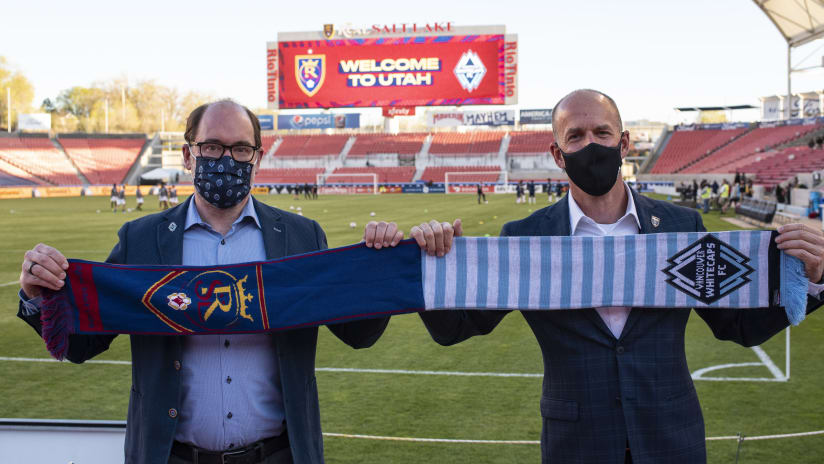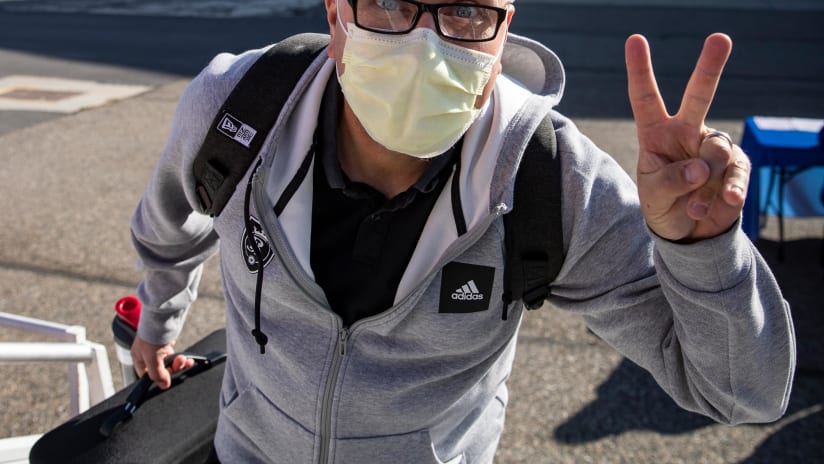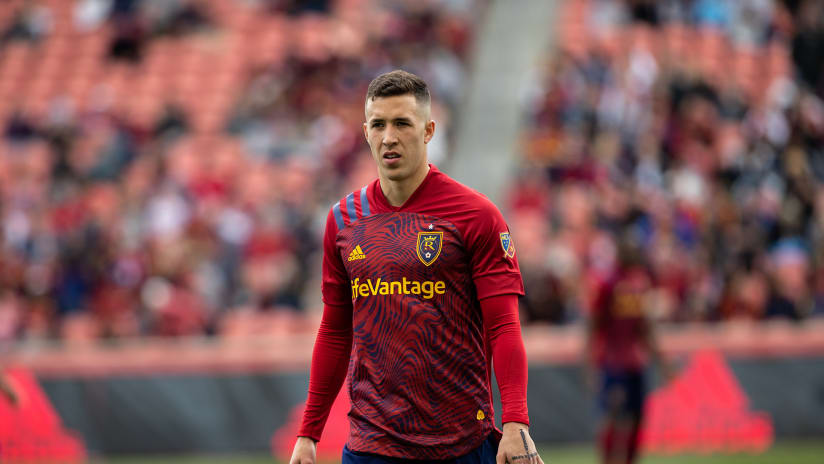After reaching the playoffs and advancing in the postseason in two consecutive seasons, Real Salt Lake was out of the postseason picture in 2020 during a tumultuous season. We sat down with RSL General Manager Elliot Fall to discuss the season and how to approach the team moving forward.
Q: How do you assess 2020 for RSL?
A: It was a disappointing year. We did not achieve the goals we set out to achieve on the field. Obviously, it was a very challenging and complicated year, but the reality is we didn't win enough games and it was disappointing and we need to be better. In 2021, and beyond. We owe it to our fans, and we owe it to this organization to be better.
Q: In what ways do you look to improve this team for next year? Because there is a development element to everything, how do you look at building this team for 2021 based on the development paths of those players that have been involved?
A: We need to take a holistic view of the of the roster. As disappointing as this year was, there are a lot of pieces on this roster that we believe in and that we believe can play significant roles in a successful year and in a successful team. And so it's twofold. One, we need to do a better job of creating an environment that facilitates the development and allows those players to flourish. And we, at the same time, need to evaluate spots on the roster and continue to get better. So we're always looking globally to get better and to improve. And that is as important as ever right now. But we also have to be true to who we are as a club, which is a club that is invested in our processes and our procedures and our development and specifically our youth development. So we need to ensure that we're providing a platform for those players to continue to get better and to take those steps forward that allow them to be contributors on a successful team.
Q: When you assess things, is it difficult to separate the general manager who's involved day-to-day and the fan who regardless of method and in vision just wants to see success on the field?
A: Yeah, it's always difficult and I think a little more broadly speaking, in our jobs, it's important that we do the best job we can to remove the emotions from the decision-making process. You don't make your best decisions when you're emotional. You make your best decisions when you can be analytical and you can take a rational view of a situation and through your processes and procedures - and with the collective group that we have - come to a productive decision. So, is that removing my fandom from it? In some ways it is. I mean, being a fan comes from being fanatic and that's an emotional state. And that's what we want. And that's what we are. And we all are fans of this club. Truthfully, especially a lot of the people that work in this club have grown up supporting this club and so we want this club to be successful as much as anyone. When that becomes challenging is when you have to take a step back and properly analyze what's happening. And we do have to take into account factors that you may not see from the outside or factors that you may not even at first glance, see from the inside. Because that was a disappointing year. That doesn't mean that just getting rid of all the pieces that we have is a proper response. Sometimes the toughest decisions are to stay the course and trust in the process. And so it's a balance. We have to be very cognizant of what step in the process we are at and where we are. And this is a this is a process that we take with every player individually and with the team collectively, where we are in a process and whether we are on track or not and make decisions based on that.
Q: What is your general feeling on where you're at in that process and your confidence level in the plan?
A: Collectively this year was a disappointment, as I said. So we aren't where we want to be in the plan. Individually, there are places where we were ahead of a plan and of the process and there are places where we're behind. And then there were places where we're just on course. We set out one-year, three-year and five-year plans. And in some respects each of them have to adjust over time and those are fluid. Very rarely do you set out a five-year plan and check every single box in that five-year plan and get to the end of the five-year plan. Throughout that time period, you are constantly evaluating and making some changes. So we're in the process right now of evaluating that. As I said individually, there are places where we were behind the plan. And that's why some pieces are let go - options are declined, contracts are allowed to expire, that type of thing. Conversely, there are places where we feel like we're in a good place. So that's why you see those roster decisions made. As a whole, it's an ongoing process and we're in that evaluation stage.
Q: With the pandemic and the overall arc of this season as a whole, does that hinder young player development?
A: Sure, yeah. I mean, it's impossible to avoid. To develop, you have to play and we spent the better part of three months not playing. If I were to say that we can develop at the same level while we're not playing games, that would be lying to you. That said, I think we need to continue to find ways to get that development, because, at the end of the day, we've got to evolve players that are good enough. And it doesn't matter why they don't get there, if they don't get there. For this club to be successful, we have to get them there. And so that's a part of our continued evaluation and manipulation of the process. It was a brutal year, there were a million different challenges. And all of us here in the club, everybody in society in general, had to change the way we operate. And on a daily basis, we're learning new things about it, and we're finding new ways to do things. And that doesn't just go on the field. That goes off the field on the business side in the front office. And again, in our day to day lives. So we'll continue to adapt and we'll continue to figure it out and hopeful for RSL but more so for our global society, we get back to a normal at some point. But in the meantime, we have to continue to learn and continue to grow.
Q: There wasn't much you could do in the summer transfer window. How much did that affect the plan or vision you have?
A: I don't think it necessarily affected the long-term plan or vision. Now, it affected our ability to evaluate during this season as much because we hadn't been playing. We didn't have games to evaluate. We didn't even have training sessions to evaluate for large chunks of the year. And so it certainly impacted this year. And then of course, the travel restrictions and the immigration situations and the global environment that we're dealing with. And not just us, but every team and every MLS club and again, society as a whole. It impacts our ability to do business the ways that we have traditionally done business. But long-term I don't think it has a real impact. Yeah, it meant that we didn't bring in a player or two in the summer window that we may or may not have under a normal scenario, but it doesn't mean that we're not going to bring players in moving forward.
Q: For for the locker room, Nedum Onuoha was obviously a big piece. Organizationally, what do you lose with the with his retirement?
A: You lose leadership and experience. You lose that steadying presence in the spine of your team that has seen it all and done it all and can help lift the guys around him. And most importantly, you lose a great person. You lose a guy that brought a dignity and a professionalism and a presence that doesn't come around very often. So he's certainly a big loss. That said, it's also a real opportunity for that development we talk about. We have a lot of really good people in our locker room and a lot of a lot of young players that have been around for a long time and they now have an opportunity to grab hold of roles that they maybe didn't have the opportunity to grab hold of in the past. You don't replace a guy like Nedum with one guy. It takes a collective effort. But I think it's something that our group is up to and hopefully something that that we can also bring in some pieces that have some of those qualities as well.
Q: What is his legacy at RSL?
A: I don't know exactly what his legacy is, but I know it's much bigger than the two-and-a-half years that he spent here would traditionally make you think it would be. He had an impact on a lot of people in a lot of ways on and off the field that transcends what you normally see from an international player who comes in for the last several years of his career. And this is no disrespect to anybody but you don't normally see the impact in that time period that Nedum had on this this organization in this group.
Q: This being your first year as General Manager, what did you learn? What was your personal biggest takeaway from the year?
A: That's a good question. I think my biggest takeaway is that we can never let up. As an organization, we always need to be pushing to move forward and in many respects push the envelope. But I also would say that I learned a lot about myself personally and us as a group in our ability to confront adversity and continue to strive for positivity change. We definitely
need to learn from the mistakes that we made. But much like we're an organization that's about development on the field, we also need to look ourselves in the mirror and develop off of the field and get better. Just like we ask our players when they have a bad performance or a bad stretch or a bad year to evaluate and understand and come back and improve, we have to do the same thing. We have to go back and evaluate the decisions we made this year. In the moment, we believed in the decisions, but some of them ended up being right, some of them ended up being wrong. We have to be honest with ourselves. We have to recognize those things. And we have to put in place a structure that allows us to make more of the good decisions and less of the bad decisions.
Q: When you look at this team in 2020 and imagine in your head what this team looks like in 2021, how much can you say now about what you want that team to look like in 2021 that is different than 2020?
A: I think in 2021, we want to play more positive, dynamic, attacking soccer. And look, that's something you're going to say every year. You always want to be more positive and more dynamic and have the ball more and attack more. But I think I think this year more than a lot of other years we weren't the dynamic attacking threat that we that we want to be. We absolutely have some pieces in place that can be a part of that. But we also recognize that we may need to add a piece or two to get to where we want to be. And that's our job.



